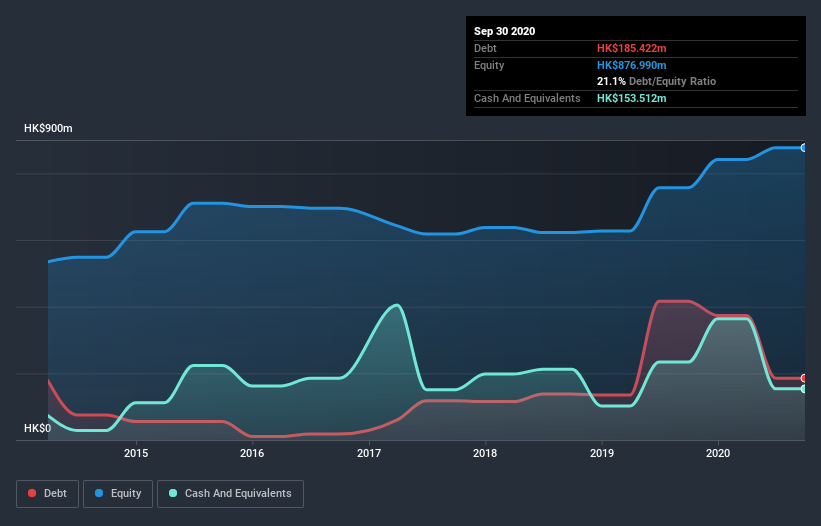
Legendary fund manager Li Lu (who Charlie Munger backed) once said, 'The biggest investment risk is not the volatility of prices, but whether you will suffer a permanent loss of capital.' So it might be obvious that you need to consider debt, when you think about how risky any given stock is, because too much debt can sink a company. We note that Magnus Concordia Group Limited (HKG:1172) does have debt on its balance sheet. But is this debt a concern to shareholders?
Why Does Debt Bring Risk?
Debt assists a business until the business has trouble paying it off, either with new capital or with free cash flow. Part and parcel of capitalism is the process of 'creative destruction' where failed businesses are mercilessly liquidated by their bankers. While that is not too common, we often do see indebted companies permanently diluting shareholders because lenders force them to raise capital at a distressed price. Of course, plenty of companies use debt to fund growth, without any negative consequences. When we examine debt levels, we first consider both cash and debt levels, together.
Check out our latest analysis for Magnus Concordia Group
What Is Magnus Concordia Group's Net Debt?
You can click the graphic below for the historical numbers, but it shows that Magnus Concordia Group had HK$185.4m of debt in September 2020, down from HK$416.5m, one year before. However, it also had HK$153.5m in cash, and so its net debt is HK$31.9m.

A Look At Magnus Concordia Group's Liabilities
The latest balance sheet data shows that Magnus Concordia Group had liabilities of HK$2.44b due within a year, and liabilities of HK$455.6m falling due after that. Offsetting these obligations, it had cash of HK$153.5m as well as receivables valued at HK$74.3m due within 12 months. So it has liabilities totalling HK$2.67b more than its cash and near-term receivables, combined.
This deficit casts a shadow over the HK$601.0m company, like a colossus towering over mere mortals. So we definitely think shareholders need to watch this one closely. After all, Magnus Concordia Group would likely require a major re-capitalisation if it had to pay its creditors today. The balance sheet is clearly the area to focus on when you are analysing debt. But you can't view debt in total isolation; since Magnus Concordia Group will need earnings to service that debt. So if you're keen to discover more about its earnings, it might be worth checking out this graph of its long term earnings trend.
In the last year Magnus Concordia Group wasn't profitable at an EBIT level, but managed to grow its revenue by 195%, to HK$974m. So its pretty obvious shareholders are hoping for more growth!
Caveat Emptor
While we can certainly appreciate Magnus Concordia Group's revenue growth, its earnings before interest and tax (EBIT) loss is not ideal. Indeed, it lost HK$14m at the EBIT level. Combining this information with the significant liabilities we already touched on makes us very hesitant about this stock, to say the least. That said, it is possible that the company will turn its fortunes around. But we think that is unlikely since it is low on liquid assets, and made a loss of HK$95m in the last year. So we think this stock is quite risky. We'd prefer to pass. There's no doubt that we learn most about debt from the balance sheet. But ultimately, every company can contain risks that exist outside of the balance sheet. Like risks, for instance. Every company has them, and we've spotted 4 warning signs for Magnus Concordia Group (of which 1 makes us a bit uncomfortable!) you should know about.
When all is said and done, sometimes its easier to focus on companies that don't even need debt. Readers can access a list of growth stocks with zero net debt 100% free, right now.
When trading Magnus Concordia Group or any other investment, use the platform considered by many to be the Professional's Gateway to the Worlds Market, Interactive Brokers. You get the lowest-cost* trading on stocks, options, futures, forex, bonds and funds worldwide from a single integrated account. Promoted
New: Manage All Your Stock Portfolios in One Place
We've created the ultimate portfolio companion for stock investors, and it's free.
• Connect an unlimited number of Portfolios and see your total in one currency
• Be alerted to new Warning Signs or Risks via email or mobile
• Track the Fair Value of your stocks
This article by Simply Wall St is general in nature. It does not constitute a recommendation to buy or sell any stock, and does not take account of your objectives, or your financial situation. We aim to bring you long-term focused analysis driven by fundamental data. Note that our analysis may not factor in the latest price-sensitive company announcements or qualitative material. Simply Wall St has no position in any stocks mentioned.
*Interactive Brokers Rated Lowest Cost Broker by StockBrokers.com Annual Online Review 2020
Have feedback on this article? Concerned about the content? Get in touch with us directly. Alternatively, email editorial-team (at) simplywallst.com.
About SEHK:1172
Magnus Concordia Group
An investment holding company, engages in the property, printing, and treasury businesses in Hong Kong, Mainland China, the United States, the United Kingdom, France, and internationally.
Low and slightly overvalued.
Similar Companies
Market Insights
Community Narratives



